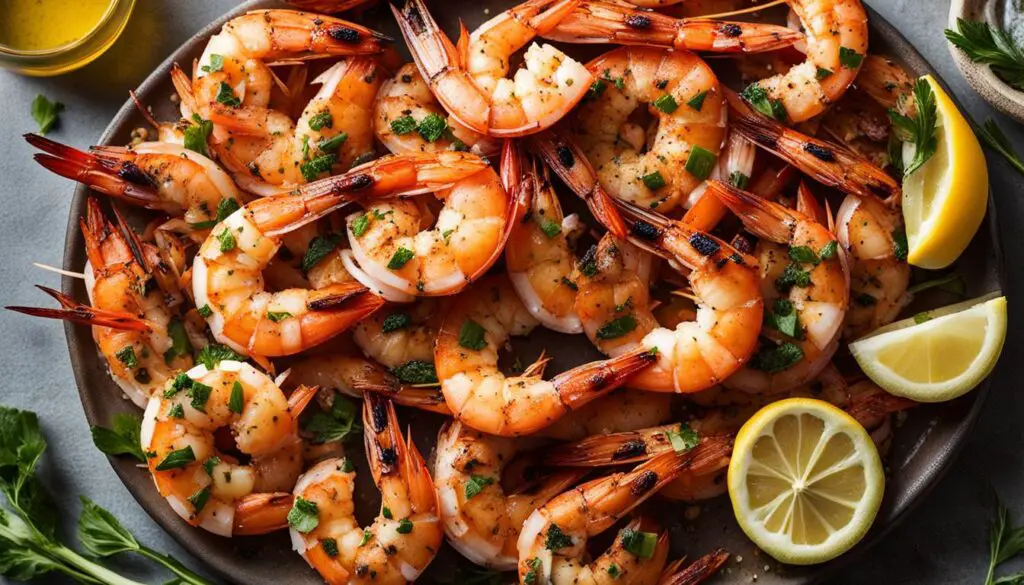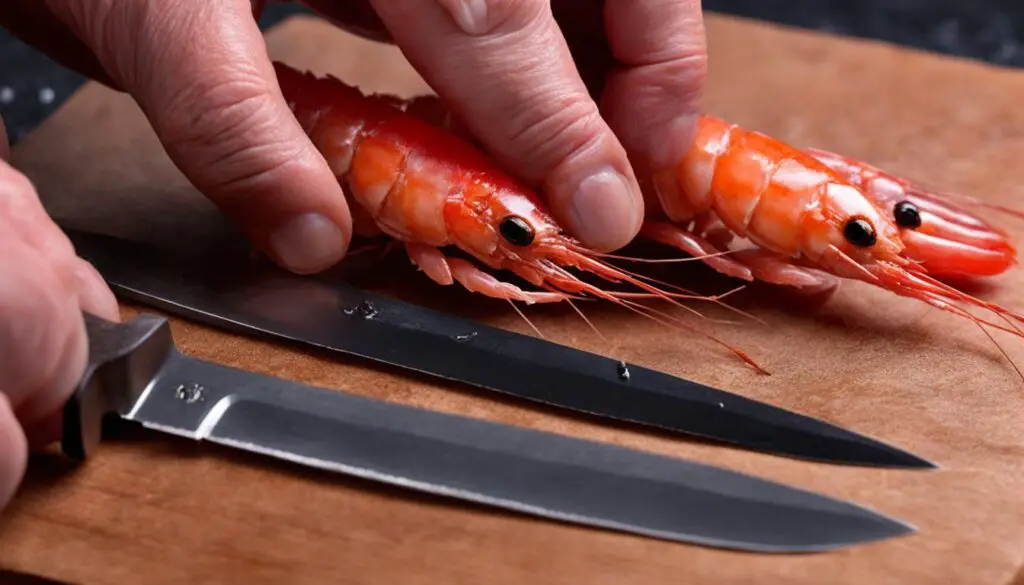When marinating shrimp, it is important to consider the optimal marinating time to ensure that the shrimp retains its flavor and texture. The duration of marination can vary depending on the ingredients used in the marinade and the cooking method. In this article, we will explore the recommended shrimp marinade length and provide tips for marinating shrimp to perfection.
Key Takeaways:
- Marinating time for fresh shrimp can range from 1 to 8 hours.
- The optimal marinating time depends on the marinade ingredients and desired flavor intensity.
- Avoid leaving shrimp in citrus-based marinades for too long, as it can lead to overcooking.
- Experiment with different marinade variations and cooking techniques to find your favorite combination.
- Marinating shrimp enhances flavor and texture, making it a delicious and versatile seafood option.
The Best Shrimp Marinade Recipe
The key to a delicious shrimp dish lies in a flavorful marinade. This bold and zesty marinade combines garlic, herbs, spices, and lemon to create a burst of flavor that will elevate your shrimp to new heights. Whether you’re grilling, cooking on the stovetop, or baking, this marinade is perfect for any cooking method.
To create this savory marinade, you’ll need a combination of olive oil, soy sauce, lemon zest, honey, herbs, garlic, and seasonings. These ingredients work together harmoniously to infuse the shrimp with a rich and tantalizing taste.
For optimal flavor absorption, it is recommended to marinate the shrimp for at least one hour, but you can leave them marinating for up to 8 hours. This allows the shrimp to absorb all the flavors from the marinade and imparts a delightful taste to each bite.
One important note: this marinade does not contain any citrus juice. Citrus juice can react with the shrimp and cook it if left for too long. By omitting citrus juice from the marinade, you can confidently marinate the shrimp without worrying about overcooking.
If you’re following a gluten-free diet, you can easily make this marinade gluten-free by substituting tamari sauce for soy sauce. Tamari sauce has a similar flavor profile to soy sauce but is gluten-free, making it a great alternative.
Not only can this marinade be used for shrimp, but it also works well with other types of seafood such as scallops, salmon, swordfish, or halibut. The bold and zesty flavors complement the taste of these seafood varieties and enhance their natural flavors.
Tips for Marinating Shrimp
Marinating shrimp is a great way to infuse them with delicious flavors and enhance their taste. To help you achieve the perfect marinated shrimp, here are some useful tips:
- Make the Marinade in Advance: Prepare your shrimp marinade ahead of time and let it sit in the fridge for at least 30 minutes to allow the flavors to meld together. For even better results, make the marinade a day or two in advance and refrigerate it until you’re ready to use it. This will intensify the flavors and make the shrimp even more flavorful.
- Leave the Tails On: When marinating shrimp, you have the option to leave the tails on or remove them. Leaving the tails on not only adds visual appeal but also provides a convenient handle for picking up the shrimp. If you’re serving the shrimp as a finger food or appetizer, keeping the tails on can make it easier for your guests to enjoy.
- Opt for Gluten-Free Marinade: If you follow a gluten-free diet, you can easily make a gluten-free shrimp marinade. Substitute soy sauce with tamari sauce, which is a gluten-free alternative. This way, you can enjoy delicious marinated shrimp without compromising your dietary needs.
- Use Larger Shrimp: For the best flavor and presentation, opt for larger shrimp when marinating. Larger shrimp tend to be juicier and more flavorful, which makes them perfect for absorbing the marinade flavors. Their size also makes them more visually appealing when plated.
- Pair with Steak for a Surf and Turf Dinner: For a delicious and indulgent meal, consider pairing your marinated shrimp with a juicy steak. The combination of the savory shrimp flavors and the rich beefy taste of the steak creates a mouthwatering surf and turf experience.
By following these tips, you’ll be able to marinate shrimp like a pro and create flavorful dishes that will impress your family and friends.
Enjoy gluten-free shrimp marinade for a flavorful and satisfying meal!
Cooking Methods for Marinated Shrimp
Now that you have marinated your shrimp to perfection, it’s time to explore the various cooking methods that will bring out the best flavors in your dish. Whether you prefer grilling, broiling, or sautéing, there’s a method that suits your taste and cooking style.
Grilling Shrimp
Grilling shrimp adds a delicious smoky flavor that complements the marinade. Follow these simple steps to grill your marinated shrimp:
- Preheat your grill to medium-high heat.
- Place the marinated shrimp directly on the grill grates.
- Cook the shrimp for 2-3 minutes per side, or until they turn pink and opaque.
Grilled shrimp pairs well with a fresh salad or as a tasty addition to a seafood platter.
Broiling Shrimp
If you don’t have access to a grill, broiling is an excellent alternative for cooking marinated shrimp:
- Set your oven to the broil setting.
- Place the marinated shrimp on a baking sheet lined with aluminum foil.
- Keep a close eye on the shrimp and broil them for 1-2 minutes per side, ensuring they don’t overcook.
Broiled shrimp are perfect for adding to pasta dishes, tacos, or enjoying on their own as a flavorful appetizer.
Sautéing Shrimp
If you prefer a stovetop cooking method, sautéing the marinated shrimp is a quick and easy option:
- Heat oil or butter in a skillet over medium-high heat.
- Add the marinated shrimp to the skillet.
- Cook the shrimp for 3-4 minutes, stirring occasionally, until they are pink and no longer translucent.
Sautéed shrimp are versatile and can be served as a main course, in a stir-fry, or as a flavorful addition to pasta dishes.
| Method | Cooking Time | Best For |
|---|---|---|
| Grilling | 2-3 minutes per side | Enhancing the smoky flavors |
| Broiling | 1-2 minutes per side | Quick and convenient cooking |
| Sautéing | 3-4 minutes | Fast stovetop cooking |

Experiment with these cooking methods to find your favorite way of preparing marinated shrimp. Each method brings out unique flavors and textures, allowing you to create a variety of delicious dishes for any occasion.
How to Peel and Devein Shrimp
Preparing shrimp for marinating involves two essential steps: peeling and deveining. Whether the shrimp comes with or without shells, these techniques ensure a delicious and hassle-free cooking experience.
Peeling Shrimp
If your shrimp still have shells on, follow these steps to remove them:
- Hold the shrimp firmly in one hand, grasping the main part of the shell with your fingers.
- Gently pull off the shell, starting from the head end and working towards the tail.
- Once the main part of the shell is removed, you can choose to leave the tail intact for presentation purposes or remove it for convenience.
If your shrimp already come shelled, you can skip this step and move on to deveining.
Deveining Shrimp
To remove the vein from the shrimp, which can sometimes impart a gritty texture and a slightly bitter taste, follow these steps:
- Inspect the top of the shrimp for a dark line running along its back. This line is the vein.
- Using a paring knife, make a shallow slit along the top of the shrimp, following the line of the vein.
- Expose the vein and remove it by either lifting it out with the tip of the knife or using a wooden skewer to lift it out.
Once the shrimp is peeled and deveined, it is ready to be marinated and cooked according to your desired recipe. Enjoy the delicious flavors of perfectly prepared shrimp!

Other Shrimp Marinade Variations
The shrimp marinade recipe mentioned earlier can also be used to marinate other types of seafood such as scallops, salmon, swordfish, or halibut. The marinade’s bold and zesty flavors complement the taste of fresh seafood and enhance its flavor. When using the marinade for other types of seafood, adjust the cooking times and methods accordingly to ensure that the seafood is cooked to perfection.
Here are some suggestions for marinating other types of seafood:
Scallops: Marinate scallops in the same shrimp marinade for 15-30 minutes. Grill over medium-high heat for 2-3 minutes per side until they are firm and opaque.
Salmon: Place salmon fillets in the marinade and refrigerate for 30 minutes to 1 hour. Grill or bake the salmon until it flakes easily with a fork.
Swordfish: Marinate swordfish steaks for 1-2 hours. Grill on high heat for 4-5 minutes per side until the fish is opaque and cooked through.
Halibut: Marinate halibut fillets for 30 minutes to 1 hour. Grill or bake the halibut until it is opaque and flakes easily with a fork.
Experiment with these shrimp marinade variations and enjoy the delightful flavors they bring to your favorite seafood dishes.
Conclusion
In conclusion, the marinating time for shrimp plays a crucial role in achieving the perfect flavor and texture. The recommended duration for marinating shrimp is at least one hour, but it can be extended up to 8 hours. The ideal marinating time depends on the ingredients used in the marinade and the desired intensity of flavor.
It is important to be mindful of the acidity level in the marinade, as citrus juice can prematurely cook the shrimp. By following the recommended shrimp marinade length and considering the acidity, you can ensure that the shrimp remains tender and succulent.
Experimenting with different marinade variations and cooking techniques can elevate the taste of marinated shrimp. Whether you choose to grill, broil, or sauté the shrimp, the marinating time will greatly enhance the overall outcome. This process allows the flavors to penetrate the shrimp, resulting in a mouthwatering dish that tantalizes the taste buds.
So, next time you’re planning to marinate shrimp, remember the importance of marinating time. Take the time to prepare a flavorful marinade, allow the shrimp to marinate for the optimal duration, and explore different cooking methods to create a memorable seafood experience.
FAQ
What is the optimal marinating time for shrimp?
It is recommended to marinate the shrimp for at least one hour, or up to 8 hours, to allow the flavors to infuse into the shrimp.
What ingredients are in the best shrimp marinade?
The best shrimp marinade includes garlic, herbs, spices, lemon, olive oil, soy sauce, lemon zest, honey, and seasonings.
How can I make the shrimp marinade gluten-free?
Substitute tamari sauce for soy sauce to make the marinade gluten-free.
Should I leave the tails on the shrimp when marinating?
It’s up to you! Leaving the tails on can enhance the presentation, but removing them can make the shrimp more convenient to eat.
How should I cook marinated shrimp?
Marinated shrimp can be cooked by grilling, broiling, or sautéing. Cook for about 2-3 minutes per side until the shrimp turn pink and opaque.
How do I peel and devein shrimp?
To peel shrimp, pull off the main part of the shell with your fingers, then remove the tail end. To devein, make a slit along the top of the shrimp with a paring knife and remove the vein with a knife or wooden skewer.
Can I use the shrimp marinade for other types of seafood?
Yes, the bold and zesty flavors of the marinade can be used to marinate other seafood, such as scallops, salmon, swordfish, or halibut.
